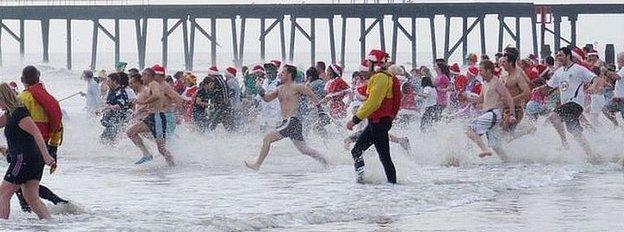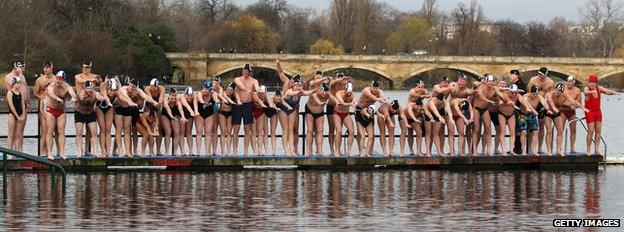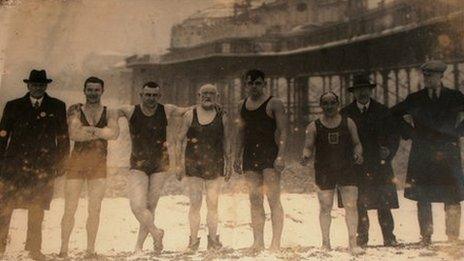Christmas Day swimmers face cold water danger
- Published

The dash into the sea at Lowestoft has been taking place for 35 years
For many people taking a dip in icy waters has become as much a Christmas morning tradition as opening presents and preparing the sprouts. But why do people do it and are there any risks?
As Christmas morning dawned, hardy types from all over the country were putting on their swimming costumes.
Some were wearing Santa hats, others may have decide to wear nothing at all, but all were intent on splashing about in seas and lakes around the UK.
The tradition is not new, with some events tracing their origins to Victorian times, but it does seem to have gained popularity in recent years.
"It's a bit like banging your head against a brick wall - it feels great when you stop," said Brian Thomas, secretary of Serpentine Swimming Club.
His club, in Hyde Park, London, holds its members-only swimming race every Christmas morning, attracting attention from all over the world.
It began in 1864 and Peter Pan author JM Barrie used to present the winner with a cup at the beginning of the 20th Century.

Swimmers in the Serpentine in Hyde Park prepare to dive in on Christmas Day morning 2012
Mr Thomas said: "What's more quirky than a hundred yard swimming race, at just above freezing, on Christmas Day in the middle of London?
"It's a magical swim and it's a big atmosphere, with TV cameras from all over the world. It's uniquely English."
But, according to Mr Thomas, people should not swim in the water unless they are used to it.
"I wouldn't advise it to anybody who hasn't acclimatised by swimming in autumn, as your body would just panic and you will hyperventilate," he said.
"I enjoy swimming outside and the weather just gets in the way. It's quite exhilarating, but you don't want to be in there too long."
The dangers of cold water swimming are increased in the sea, with tides and currents making conditions more difficult.
Most of the largest swims take place on the coast, including Exmouth, Lowestoft and Brighton.
Fiona Southwell, who is the sea swimming coach at Brighton Swimming Club, said: "There's something special about Christmas - it gets everyone out of the house, even if you're a spectator."

Brighton Swimming Club has been in existence for 152 years
However, she said in recent years there has been more risky behaviour from non-club swimmers as numbers have increased.
Two years ago a man had to be rescued by club members after he got into difficulty. He was taken to hospital where he was treated for hypothermia.
This year, Brighton and Hove City Council has closed the area of the beach where the swim takes place because of severe weather conditions.
"Some people are pretty silly, in one instance I saw a woman with a baby in her arms go into the sea," she said.
"Over the years it has gone from just members and a few people watching, to upwards of 4,000 people.
"They think it is great and jump in wearing Santa hats, other outfits and sometimes in the nude.
"But there's a risk of hypothermia especially if there's alcohol in your body, which speeds the process up."
However, according to Ms Southwell, the benefits of cold water swimming - done properly - outweigh the risks.
"It improves circulation and means you're less likely to get an upper respiratory infection.
"It's also a great calorie burner, which is very useful at this time of year."
- Published26 December 2013
- Published29 November 2013
- Published26 December 2012
- Published24 December 2012
- Published25 December 2011
- Published9 September 2011